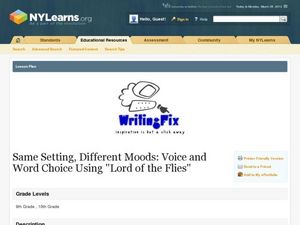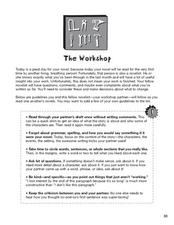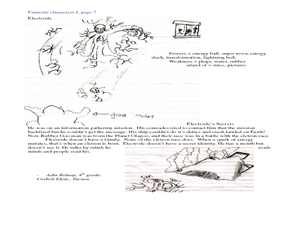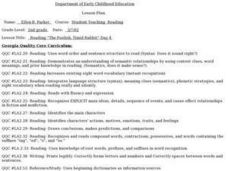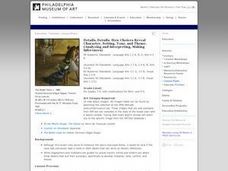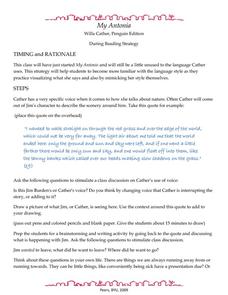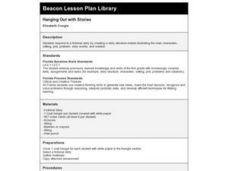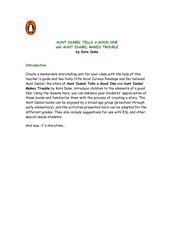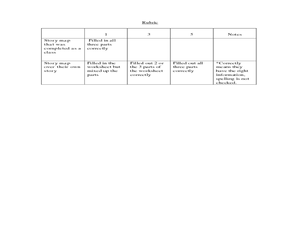Curated OER
Same Setting, Different Moods: Voice and Word Choice Using Lord of the Flies
Whether it's dark, delightful, or somber, set the mood with William Golding's Lord of the Flies. High-schoolers practice descriptive writing by creating the appropriate mood for an original scene, starring one of the book's main...
Curated OER
Mystery Lessons
Learn about mysteries with your readers. They will investigate plot, basic elements of mystery, famous characters, and become familiar with genre vocabulary. Bring in props and mystery books to begin and then have learners create story...
Curated OER
Noisy Nora, Studious Students: Story Elements
Alliterative adjective nicknames generate stories inspired by Rosemary Wells' book Noisy Nora (also a thematic complement to any class with children who make a ruckus to get attention). Class members explore basic story elements --...
Curated OER
The Workshop
Kids take a critical look at each other's work in order to understand the editing process while providing constructive suggestions. This handout really sets learners up to successfully offer constructive critique to their...
Curated OER
fantastic Characters
Students study stories. In this writing lesson, students discuss the three aspects of a story, read stories focusing on the characters, write a story as a class about a character made up by the class, and write a story with an exciting...
Curated OER
Lesson 2: Using Setting to Make Predictions about Characters
Fourth graders look at the importance of setting in a story. In this setting activity, 4th graders see how the setting of a story affects the actions of the characters and how you can predict these actions based on the setting. They read...
Curated OER
Setting's Effect on a Character's Actions
Do the actions of a character in a story change based on the setting the writer provides? Learners explore the concept of character action in relation to story setting by investigating the setting and events in the story Science...
Curated OER
Narrative Nuts and Bolts
After viewing slides and reading about child labor, young authors compose an original narrative story. They practice note-taking skills and work to effectively engage a reader by incorporating plot, logical order, complex characters,...
Curated OER
Identifying Story Elements
Help your class identify story elements. They will discuss character, setting, problem, and solution after reading a story. A graphic organizer will help them to identify various elements with guided practice and independent practice...
EngageNY
Close Reading to Learn about Lyddie’s Character
Scholars work in pairs to analyze the characters, plot, and setting of Katherine Paterson's novel, Lyddie. Next, they apply what they learned about the characters' feelings and motivation to perform a mini reader's theater.
Generation Rx
My Generation Rx: Plot Twists
How can prescription drugs be dangerous if they were prescribed by a doctor? Is it okay to share your prescription drugs with friends if they really need them? Clear up any common misconceptions about prescription drugs with a set of...
Curated OER
Plot Development
Students identify the elements of plot and write a script with a strong plot. For this plot lesson, students identify elements of plot in examples by completing a chart and a graphic organizer. Students then create plots from...
Curated OER
Story Setting - The Art Lesson by Tomi dePaola
Students read the book The Art Lesson by Tomi dePaola and analyze the story. In this setting lesson, students discuss the importance of the setting and how it helps us understand the story. Students answer questions and chart their...
Curated OER
Language Arts: Plotting Stories
Second graders read the story, "The Foolish, Timid Rabbit," as part of a unit on appearances. After reading with partners, they write their own stories that include elements about some forms of matter from their science studies. Students...
Curated OER
Plot/Story Problem/Resolution
Students analyze the plot, problem, and resolution of a story. In this story analysis lesson, students read stories and fill out graphic organizers about the plot, story problems, and resolution.
Curated OER
Details, Details: How Choices Reveal Character, Setting, Tone, and Theme. (Analyzing and Interpreting, Making Inferences)
Students respond to works of art. In this art interpretation instructional activity, students examine images of art while using concepts they learned as they read literary pieces. They detail the setting, characters, and the mood and...
Curated OER
Adventure Writing: Oregon's Landscape as a Setting
Learners identify geographical features of different regions encountered by migrants on the Oregon trail. Students research how the Oregon landscape may have affected life and 19th century westward migration. Learners write a narrative...
ReadWriteThink
Comics in the Classroom as an Introduction to Narrative Structure
A picture is worth a thousand words, but a comic strip combines both images and words for the ultimate narrative effect. After reading The Three Little Pigs and deciphering the plot elements, elementary readers work through four...
Curated OER
The Similarities and Differences of Setting
Sixth graders identify components of the setting in science fiction text. In this compare and contrast settings instructional activity, 6th graders read Only You Can Save Mankind and identify similarities and differences between...
Curated OER
My Antonia: During Reading Strategy
Home in on the quote on this page to explore setting, the author's and character's voices, and plot in Willa Cather's My Antonia. Pupils draw a picture of what is described in the quote, discuss the content, and make connections to their...
Curated OER
Comparing Characters Across Two Short Stories
Ninth graders listen to a read aloud of two short stories focusing on literary devices. The write about the settings and realism of the stories, and decide each main character handles the conflict he faces with nature.
Curated OER
Hanging Out with Stories
Help your class listen and respond to a fictional story by creating a story structure mobile illustrating the main characters, setting, plot, problem, story events, and solution. Using a coat hanger, they will create an artistic element...
Curated OER
Aunt Isabel Tells a Good One...
Explore language arts by reading two similar stories in order to compare and contrast them in class. Young readers read two Aunt Isabel books, by Kate Duke, and discuss the main characters, plot, and setting. They complete a graphic...
Curated OER
Story Stew
Learners identify the elements of a story. In this reading and writing lesson, pupils read the book, Tyrone the Horrible by Hans Wihelm and then identify the characters, setting, and plot of the story.This lesson includes adaptations and...
